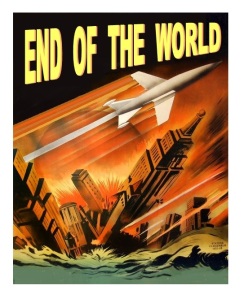Synopsis:
A newly discovered comet passing close to Earth threatens to destroy the planet. Various characters — an astronomer, a man of the cloth, a wealthy man, a mine worker and his family — try to cope with the impending doom.
Reaction & Thoughts:
This Danish production isn’t a great movie per se, but it’s an intriguing snapshot of early nineteenth-century sensibilities. It can also be considered the precursor of the modern disaster movie: The End of the World isn’t all that different from movies like Deep Impact (1998), The Day After Tomorrow (2004) and 2012 (2009).
The Halley’s Comet passed close to Earth in 1910, nearly six years before the movie was made. Not long after the comet was seen, WWI erupted, causing economic and political unrest across the world. The End of the World (also known as The Flaming Sword) slyly exploits people’s anxieties regarding these two unrelated events.
Two-thirds of the screenplay is dedicated to character development. The last-third is composed of scenes depicting chaos and mayhem. Fast-forward 100 years, and, incredibly, today’s disaster epics use the same blueprint: Introduce a series of characters, then show them in perilous situations. Isn’t that something? More than ten decades of advances in cinema have not altered the familiar formula!
Interestingly, the comet is presented as a celestial agent who dispatches justice fairly and accordingly — sinners suffer horrible deaths while the righteous inherit what’s left of Earth. Although it is made perfectly clear that a comet is a natural phenomenon, the film suggests that God uses this celestial object as a punishment tool.
It goes without saying that the visual effects are very primitive by today’s standards. Still, it’s fun to see the technical capabilities of cinema in the 1910s. Some optical effects are pretty cool. A meteor shower, a flood, the destruction of buildings, etcetera, it’s all done in a clever and relatively convincing manner. To paraphrase Norma Desmond’s famous line, “They didn’t need computers, they had imagination!”
Conclusions & Final Thoughts:
The End of the World is one of the very first disaster films, and as such it is a lot of fun for those of us who enjoy the sub-genre. The film was thought to have been lost, but it was recently discovered and restored. B&W, 77 minutes, Not Rated.
P.S. This is my contribution to The End of the World Blogathon, co-hosted by Movie Movie Blog Blog and The Midnite Drive-In.





As a film buff and a Dane, I ought to have at least heard of this Danish sci-fi, which I oddly haven’t. Perhaps I’ll be able to track down the restored print. Did you watch the English version?
LikeLiked by 1 person
YouTube has the restored version. It has both Danish and English intertitles: https://www.youtube.com/watch?v=4FTXX6yG2XI&t=1696s
LikeLiked by 1 person
Pingback: Announcing THE END OF THE WORLD BLOGATHON! |·
Pingback: THE END OF THE WORLD BLOGATHON is here! |·
I saw this movie on the discount page of Oldies.com when I was shopping on it last month. It wasn’t one of the ones I ended up buying, although I did consider it. I limited myself to speding $50 and had to cull a few selections before my final buy. Now I see what I missed
LikeLiked by 1 person
Pingback: THE END OF THE WORLD BLOGATHON – Day 1 Recap |·
I wondered if there were any silent disaster movies to cover, so I’m glad you did one. Sounds intriguing! Thanks for contributing to the blogathon!
LikeLiked by 1 person
Fascinating. There is not a lot new in the realm of storytelling, whatever the medium. I love silent films and will certainly put this on the must-see list.
LikeLiked by 1 person
This sounds like a real find, even if it’s not a perfect film. Thanks for including the YouTube link!
LikeLiked by 1 person
I hope you enjoy it. It’s definitely a curio.
LikeLike